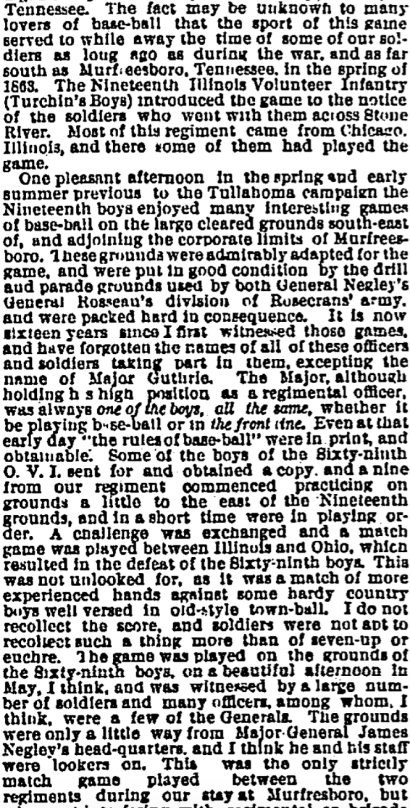In the late winter and spring of 1863, Union general William S. Rosecrans was well dug in at Murfreesboro, having held off Braxton Bragg at the Battle of Stones River. Unwilling to move quickly and take advantage of Bragg’s retreat southeast, Rosecrans instead decided to construct a large earthen fortress, consolidate his position, and wait for spring. On his part, Bragg had moved his Army of Tennessee to the hills of Tullahoma, blocking the Army of the Cumberland’s advance to Chattanooga. Secure at Murfreesboro, Rosecrans would wait until June to advance on Bragg, giving both armies nearly six months of preparation for the inevitable confrontation.
So what do encamped armies do, when they’re not parading, polishing boots, or digging trenches? Why, they play ball of course, and these armies were no different. There are a great many references to Civil War soldiers playing “ball,” but the nature of the evidence makes it difficult to reconstruct the circumstances of their games. Most of these games are only evidenced in diaries and letters back home, and these documents lack many crucial details about the nature of these ball games that were so popular in camp.
While ballplaying during battle was not entirely unknown, the best opportunities for organized games were while the soldiers were at rest, either while in training, while waiting for orders, or in prison camps. Circumstances at Murfreesboro were no different, as the endless wait provided endless chances for recreation. Private E.L. Tabler of the 51st Illinois wrote on March 25, 1863 that “the boys enjoy themselves very well playing at Ball & piching horseshoes.” Tabler doesn’t name the game further, and it could have been baseball, town ball, or another form of the game.
At the very same time the Confederates, 45 miles away at Tullahoma, were also playing ball. As Jonathan Sheppard documents in his By the Noble Daring of her Sons: the Florida Brigade of the Army of Tennessee (searchable at Google Books), town ball was a popular diversion in Bragg’s army as well. While several soldiers write about playing “ball,” and Roddie Shaw wrote a letter home specifying “town-ball,” little is known about the precise rules of these games. Nonetheless, Sheppard presumes that they would all have been playing town ball, which is reasonable given baseball’s limited popularity in the South.
As popular as town ball was, if either one of these armies had been playing the true, New York-style game of base ball, it would be one of the very first of these matches ever played in Tennessee. And as it turns out, we do have some later evidence that this may have indeed happened at Fortress Rosecrans (as the Murfreesboro encampment came to be known). In a February 25, 1879 letter to the editor of the Cincinnati Inquirer, an anonymous Union veteran recalls a proper baseball match being played by the 19th Illinois infantry against the 69th Ohio infantry in Murfreesboro in the spring of 1863.
According to this letter, the 19th Illinois (natives of Chicago) were already well-acquainted with baseball, but the 69th Ohio needed to send away for the New York rules, as they were more accustomed to the “old-style town-ball.” Details of the match itself are lacking, as the writer is unclear about the score and can remember only the victor (the 19th) and the name of one of the men taking part (Major Guthrie).
Although human memory is notoriously inaccurate, and those related to war and baseball doubly so, this account rings true on several levels. Both regiments were present at Fort Rosecrans, with Colonel Turchin indeed being the commander of the 19th Illinois. Major James V. Guthrie was also a member of the 19th, so the units do not seem to have been conflated with other regiments. I haven’t been able to corroborate the exact locations of the various headquarters and parade grounds, but the details otherwise ring true. The circumstances of the match are below.

Adding to the plausibility of this recollection is the formation in 1864 of the 19th Illinois’ “Turchin Base Ball Club,” named after the regiment’s charismatic leader, Russian-born Colonel Basil Turchin. On April 18th, 1864 the Turchin Club published a letter in the Chicago Tribune challenging the championship club of Chicago to a match. The letter also announced the gift of a sample of chestnut wood–collected from the battlefield at Chickamauga–sent to Chicago to be fashioned into a trophy for the city champion. The Turchin Club was even scheduled to play–presumably for that very bat–at Chicago’s Prairie Cricket Grounds on June 28,1864, but I’ve not been able to find the results of that match. That bat eventually came into the possession of the Excelsior Club of Chicago, and more about the history of that club and a description of the bat can be found in Peter Morris’ Base Ball Pioneers 1850-1870.
While I’ve found no further historical mention of the Turchin Club, at least four veterans of the 19th Illinois infantry would go on to participate in amateur or professional baseball after the war. Two of these men returned to Chicago to participate in the birth of professional baseball in that city. Norman T. Gassette was president of the Chicago White Stockings (now the Chicago Cub) in 1870 and 1871. Journalist James Henry Haynie was an umpire for the Forest City Club of Chicago and also the traveling secretary for the National Association in 1871.
Two more of these soldiers had a hand in the founding of amateur baseball here in Tennessee, where they settled after the war. Newspaper publisher William J. Ramage was a founding member and officer of Tennessee’s first club, the Lookouts of Chattanooga in 1865. And remember the 19th Illinois’ Turchin Club? The president of that club, Charles Theodore Flagg, moved to Nashville in 1866 and pitched for the Rock City Club in what was perhaps the first official baseball match in Tennessee history.
